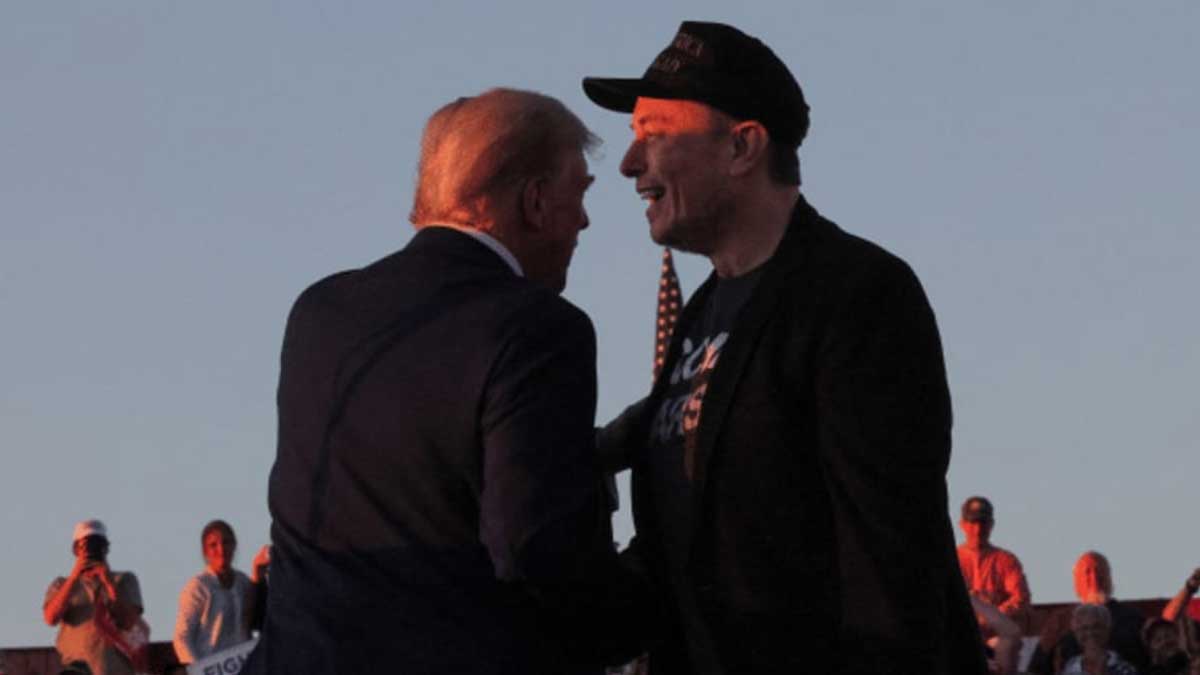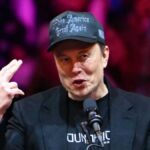- Home
- Billionaires
- Investing Newsletters
- 193CC 1000
- Article Layout 2
- Article Layout 3
- Article Layout 4
- Article Layout 5
- Article Layout 6
- Article Layout 7
- Article Layout 8
- Article Layout 9
- Article Layout 10
- Article Layout 11
- Article Layout 12
- Article Layout 13
- Article Layout 14
- Article Sidebar
- Post Format
- pages
- Archive Layouts
- Post Gallery
- Post Video Background
- Post Review
- Sponsored Post
- Leadership
- Business
- Money
- Small Business
- Innovation
- Shop
Recent Posts
Elon Musk’s Potential Role and Influence in a Trump Administration

With Donald Trump’s successful bid for re-election, the question on many minds is how Elon Musk, one of Trump’s most prominent backers and the world’s richest individual, may influence the next administration. Musk’s potential role remains largely unclear, but several key priorities and potential contributions have surfaced. Musk’s influence on Trump’s policies could be pivotal, given his prominent backing of the president’s campaign and the mutual respect between the two men.
Trump’s recent victory speech mentioned Musk at length, praising the billionaire entrepreneur for his remarkable achievements with SpaceX and Tesla. Trump called Musk a “super genius,” and celebrated SpaceX’s rocket launches and its satellite internet programs. In his characteristic style, Trump declared that “a star is born—Elon!” This warm endorsement followed Musk’s earlier support, which included over $130 million in donations to Trump’s election efforts this year. The close relationship between the two figures suggests Musk will play a significant role in Trump’s second term.
Despite the mutual admiration, Trump has been careful not to detail Musk’s specific role in his administration. However, both Trump and Musk have signaled that Musk’s influence will be substantial. Following Musk’s endorsement of Trump in July, Musk floated the idea of heading a new initiative called the “Department of Government Efficiency” (D.O.G.E.), aimed at cutting $2 trillion or more from the federal budget. Trump, for his part, has labeled Musk as the unofficial “Secretary of Cost-Cutting,” a title that reflects the entrepreneur’s penchant for efficiency and streamlined operations.
While it is clear Musk will exert influence, both Trump and Musk have downplayed the likelihood of an official Cabinet position. Trump has indicated that Musk doesn’t want to be in the Cabinet, while Musk has emphasized that he requires “no pay, no title, no recognition” for his contributions. Musk has made it clear that he plans to continue his involvement in political matters, with his political action committee, “America,” remaining active after the election. Musk stated that the committee will focus on preparing for midterm elections and other upcoming political contests.
In his recent appearance on the “Joe Rogan Experience” podcast, Musk outlined some of his priorities. He expressed a desire to reduce the size of federal agencies, ensuring that they remain focused on their original congressional mandates rather than taking on unnecessary functions. Musk also emphasized the importance of eliminating redundant regulations and agencies, arguing that if such measures inadvertently harm vital functions, they can be reinstated as needed.
Musk has offered glimpses into his vision for a Trump administration through his activity on social media, particularly on X (formerly Twitter). In a series of posts earlier this week, Musk shared minimal details about his role, including a retweet of an image portraying him as the U.S. chief technology officer. He also commented positively on the idea of dismantling the current political system, responding affirmatively to a post that called for the dismantling of Washington as we know it. Musk’s frequent interactions with the platform have painted a picture of his vision, one that includes significant government reform.
Musk’s posts have been particularly combative toward regulators. In one instance, he responded with fire emojis to a call to fire Lina Khan, the head of the Federal Trade Commission (FTC), and Gary Gensler, the chairman of the Securities and Exchange Commission (SEC). Musk has clashed with both agencies during the Biden administration, particularly over the FTC’s $150 million fine on X, which was levied due to the company’s data collection practices for advertising purposes. Musk has also been involved in legal disputes with the SEC over his use of Twitter to announce news related to Tesla, including a controversial tweet from 2018 about taking Tesla private.
A Trump administration would likely offer Musk a regulatory environment more favorable to his business ventures. Musk faces a number of ongoing lawsuits and investigations, which would likely benefit from a more lenient regulatory stance. Among these is an appeal to reinstate a $50 billion bonus tied to Tesla stock, which was struck down by a Delaware judge earlier this year. Additionally, Tesla is currently under investigation by the National Highway Traffic Safety Administration (NHTSA) regarding its autonomous driving systems, and the company faces scrutiny over its corporate practices.
A Trump administration could also ease regulatory burdens for Tesla, which would likely help the company in its competition with other electric vehicle manufacturers. As one of Musk’s most valuable assets, Tesla’s success is intricately linked to his wealth. Trump’s economic policies could give Tesla a competitive edge, potentially benefiting Musk’s bottom line. This was reflected in the sharp rally of Tesla’s stock following Trump’s victory announcement, signaling that investors see potential advantages for the company under Trump’s economic proposals.
Musk’s political journey has been marked by notable shifts. In 2016, he supported Hillary Clinton, and in 2020, he publicly endorsed Joe Biden. However, Musk’s political views began to shift rightward around 2022, coinciding with his acquisition of Twitter. In June of that year, Musk cast his first-ever vote for a Republican candidate, former Texas Rep. Mayra Flores. By November, Musk had switched his allegiance to Florida Gov. Ron DeSantis, before ultimately endorsing Trump in July 2024.
Musk’s shift has been closely tied to his views on government regulation, free speech, and business practices. His evolving political stance mirrors his desire for more autonomy in running his companies, and his growing influence within conservative political circles underscores his commitment to reducing government intervention.
Despite Musk’s prominent backing, his plan to cut $2 trillion from the federal budget has faced criticism. Scott Bessent, a hedge fund manager and Trump advisor, questioned the feasibility of such a significant reduction, noting the challenge of managing such a drastic budget cut. However, Bessent acknowledged that Musk’s management style is highly effective, which could bode well for his proposed initiatives.
Musk’s vast business empire includes SpaceX, Tesla, X (formerly Twitter), and his generative AI startup xAI. SpaceX is valued at around $210 billion, making it the second-largest private company in the world, while Tesla is a $900 billion publicly traded company. Musk holds significant stakes in both companies, as well as in X, and remains the wealthiest person globally with a net worth of roughly $280 billion, more than $60 billion ahead of the next richest individual, Amazon founder Jeff Bezos.
Elon Musk’s influence in a Trump administration is likely to be far-reaching, from reshaping government regulations to advocating for efficiency and cost-cutting measures. While the specifics of his role remain unclear, Musk’s vision of a streamlined, less regulated government aligns closely with Trump’s political agenda. His support and political activities signal a significant shift in American politics, and his influence in a second Trump term could help reshape the landscape of business and government in the U.S.
Recent Posts
Categories
- 193cc Digital Assets2
- 5G1
- Aerospace & Defense46
- AI37
- Arts3
- Banking & Insurance11
- Big Data3
- Billionaires438
- Boats & Planes1
- Business328
- Careers13
- Cars & Bikes76
- CEO Network1
- CFO Network17
- CHRO Network1
- CIO Network1
- Cloud10
- CMO Network18
- Commercial Real Estate7
- Consultant1
- Consumer Tech180
- CxO1
- Cybersecurity68
- Dining1
- Diversity, Equity & Inclusion4
- Education7
- Energy8
- Enterprise Tech29
- Events11
- Fintech1
- Food & Drink2
- Franchises1
- Freelance1
- Future Of Work2
- Games141
- GIG1
- Healthcare78
- Hollywood & Entertainment186
- Houses1
- Innovation42
- Investing2
- Investing Newsletters4
- Leadership65
- Lifestyle11
- Manufacturing1
- Markets20
- Media193
- Mobile phone1
- Money13
- Personal Finance2
- Policy567
- Real Estate1
- Research6
- Retail1
- Retirement1
- Small Business1
- SportsMoney33
- Style & Beauty1
- Success Income1
- Taxes2
- Travel10
- Uncategorized8
- Vices1
- Watches & Jewelry2
- world's billionaires407
Related Articles
Trump Moves $4B Stake in Truth Social Parent, Stock Drops 6%
Donald Trump recently transferred his 57% stake in Trump Media & Technology...
By 193cc Agency CouncilDecember 20, 2024House Rejects Trump-Backed Funding Bill, Shutdown Looms
The U.S. House of Representatives rejected a new government funding bill on...
By 193cc Agency CouncilDecember 20, 2024Trump Named Time’s Person of the Year for Second Time
On Thursday, Time magazine honored Donald Trump as its “Person of the...
By 193cc Agency CouncilDecember 12, 2024Meta Donates $1 Million to Trump’s Inaugural Fund
Meta, the parent company of Facebook and Instagram, has confirmed a $1...
By 193cc Agency CouncilDecember 12, 2024















Leave a comment